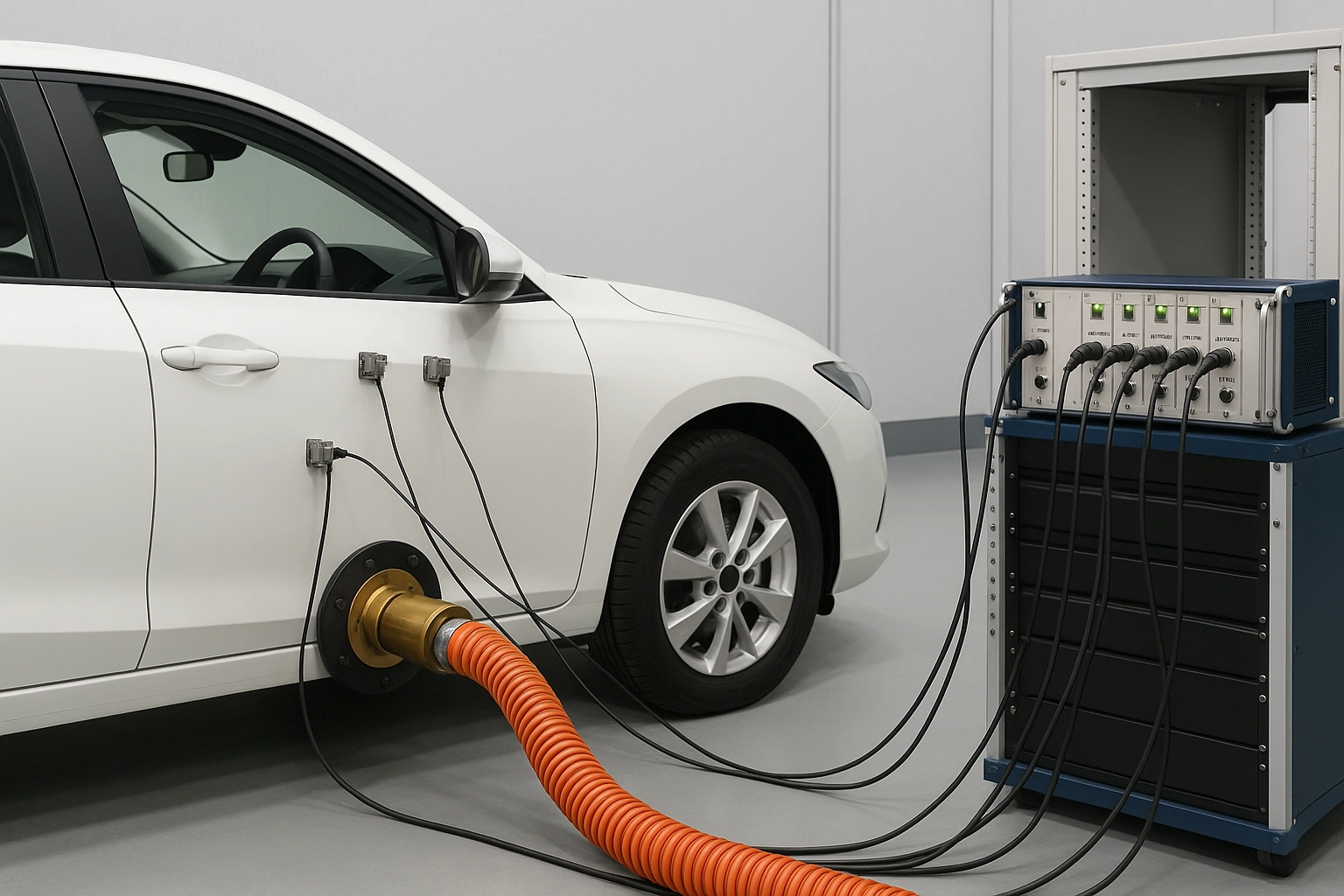JIS D0205 Acoustic Testing of Vehicle Cabins
The JIS D0205 acoustic testing protocol is a critical component in the quality assurance process for automotive vehicle cabins. This test evaluates the sound insulation performance of vehicle interiors, focusing on the cabin's ability to reduce noise from external sources such as road surfaces and engine vibrations. The standard is particularly relevant for ensuring passenger comfort by minimizing unwanted sounds that can arise during vehicle operation.
The test method involves placing a specimen representing the vehicle cabin under controlled conditions within an anechoic chamber. A sound source generates specific frequency ranges to simulate real-world driving scenarios, while sensors measure the acoustic performance of the cabin against predefined criteria. The primary goal is to ensure that the vehicle meets strict noise insulation standards set forth by JIS D0205.
Understanding the importance of this test in the automotive sector involves recognizing its role in enhancing passenger comfort and safety. Comfortable and quiet vehicles are not only preferred by consumers but also contribute positively to overall road safety. By reducing external noise intrusion, vehicle cabins can help prevent driver distraction and improve focus on the driving task.
For quality managers and R&D engineers, JIS D0205 testing provides a benchmark for performance excellence. This ensures that vehicles meet not only regulatory requirements but also exceed customer expectations in terms of interior acoustics. The data generated from these tests is essential for refining designs and materials to achieve the best possible sound insulation.
The protocol itself specifies detailed procedures, including specimen preparation, test setup configurations, and measurement techniques. Compliance with this standard ensures that the vehicle meets stringent requirements set by industry bodies like JIS. This standardization also facilitates seamless integration into global supply chains, enabling manufacturers to meet international market demands.
Real-world applications of JIS D0205 testing include various stages of product development. During initial design phases, engineers can use this data to identify potential noise sources and optimize material choices for better sound insulation. In later stages, it serves as a quality control measure ensuring that the final product performs as expected.
By adhering to JIS D0205 standards, manufacturers gain valuable insights into their products' acoustic performance across different operating conditions. This knowledge is crucial in maintaining competitive edge by offering superior cabin acoustics, which enhance customer satisfaction and brand reputation.
In summary, the JIS D0205 acoustic testing protocol plays a pivotal role in ensuring high-quality vehicle interiors that provide passengers with a comfortable and enjoyable driving experience. Its importance cannot be overstated for automotive manufacturers seeking to meet both regulatory standards and market demands.
Why It Matters
The acoustic performance of vehicle cabins directly impacts the overall driving experience, influencing factors such as passenger comfort, driver focus, and even safety. Ensuring compliance with JIS D0205 standards is essential for manufacturers aiming to deliver vehicles that meet high-quality benchmarks.
- Enhanced Comfort: Reduced external noise intrusion contributes significantly to improved passenger comfort.
- Better Driver Focus: A quieter cabin helps drivers maintain better concentration on the road, enhancing safety.
- Innovation in Design: The data from JIS D0205 tests can guide engineers towards innovative solutions for sound insulation.
- Compliance with Standards: Meeting these standards ensures that vehicles align with international quality benchmarks and regulatory requirements.
- Market Differentiation: Superior acoustic performance sets brands apart, enhancing customer satisfaction and loyalty.
The JIS D0205 standard is crucial for manufacturers looking to optimize their product offerings and ensure they meet the expectations of discerning customers. By adhering to these standards, automotive companies can enhance their reputation as leaders in quality and innovation.
Why Choose This Test
- Comprehensive Evaluation: The JIS D0205 acoustic test provides a thorough assessment of vehicle cabin acoustics.
- Industry Standards: Compliance with this standard ensures that vehicles meet international quality benchmarks.
- Data-Driven Insights: The testing process yields valuable data for refining designs and materials.
- Regulatory Compliance: Ensures that the vehicle meets strict noise insulation standards set by industry bodies.
- Customer Satisfaction: Superior acoustic performance enhances customer comfort and satisfaction.
- Risk Mitigation: Early identification of potential noise issues reduces product recalls and warranty claims.
The JIS D0205 test is an indispensable tool for quality assurance in automotive manufacturing. It offers comprehensive evaluations, aligns with industry standards, provides valuable data insights, ensures regulatory compliance, enhances customer satisfaction, and mitigates risks associated with noise issues.
Competitive Advantage and Market Impact
The JIS D0205 acoustic testing of vehicle cabins is a strategic investment that can significantly enhance a manufacturer's competitive position in the automotive industry. By ensuring superior sound insulation, manufacturers not only meet but exceed customer expectations, thereby differentiating their products from competitors.
Compliance with this standard translates to enhanced brand reputation and increased market share. Consumers are increasingly aware of the importance of acoustic comfort when choosing vehicles, making it a key factor in purchasing decisions. Automotive companies that prioritize JIS D0205 testing can capitalize on this trend by offering superior products that align with customer preferences.
The data generated from these tests is not only useful for quality control but also serves as an essential tool for innovation and design optimization. Engineers can use the insights gained to develop new materials and techniques that further enhance sound insulation, setting the stage for continuous improvement in product offerings.
Moreover, by adhering to JIS D0205 standards, manufacturers ensure that their vehicles meet international quality benchmarks, facilitating seamless integration into global supply chains. This standardization is particularly beneficial for companies operating in multiple markets, as it eliminates the need for adapting to different regional regulations and expectations.
In conclusion, the JIS D0205 acoustic testing of vehicle cabins provides a competitive edge by enhancing product quality, meeting regulatory requirements, driving innovation, and aligning with market demands. This comprehensive approach ensures that automotive companies remain at the forefront of industry trends and customer satisfaction.





